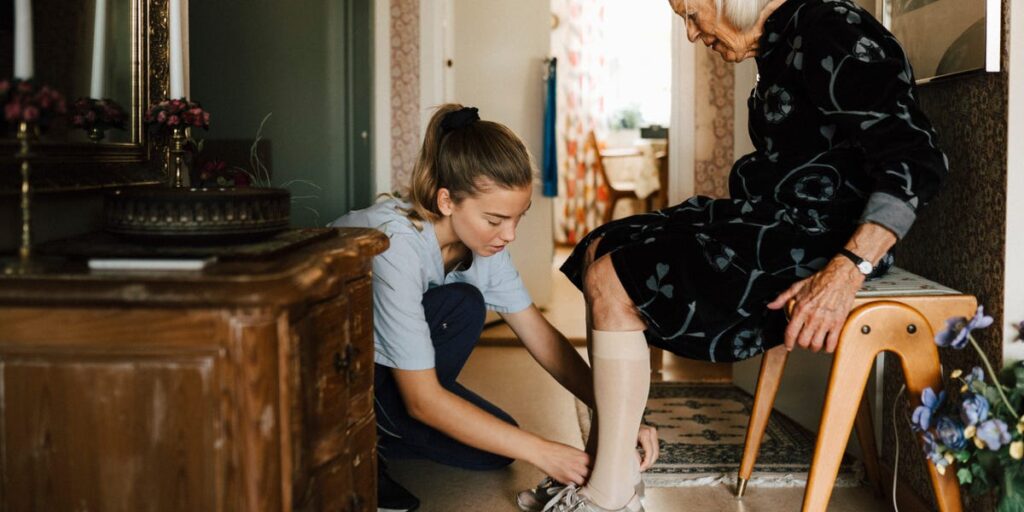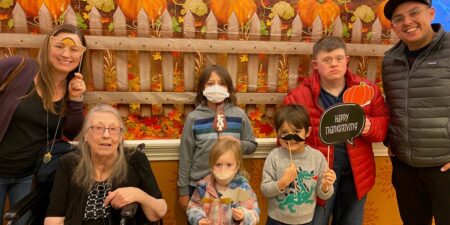I came from a strict religious family where, as a woman, I was encouraged to get married, stay home, and take care of the kids. My parents didn’t consider preparing me for anything beyond marriage and motherhood, so leaving the church caused a lot of friction with my mother, specifically.
I worked hard to be the first woman in my family to go to college and eventually found success in my career. But I struggled to have a solid relationship with my mother; we were cordial, but we weren’t close.
Now that I am her caregiver, I’m learning how to navigate this new phase in our complicated relationship.
I’ve had to let go of the bitterness to be her caregiver
My dad died unexpectedly a little over a year ago. This sudden loss caused severe stress for my mom, and her symptoms of dementia progressed quickly.
My sister and I have decided to split caregiving duties while awaiting my mother’s official dementia diagnosis. I had to let go of our history to care for her because she needed me, and I couldn’t turn my back on her.
Even though I share caregiving responsibilities, it’s not easy. I still have a preteen daughter at home and one in college. I also have a job and my own business.
Plus, my mom always has lists of things for me to do at her house: reorganize her basement, decorate her house for every season, mulch her yard, and redo her landscaping. I’m forced to neglect my own house cleaning.
Plus, I have to take her to endless doctor’s appointments. Most days, I feel like I just can’t keep up.
Caregiving has taken its toll on my own health
Since I’m always busy, I rarely have time to take care of myself. I wasn’t eating regularly, and when I did, it was something quick from a gas station. I started having dizzy spells and heart palpitations; I knew I was spreading myself thin.
One day, while driving, I had one of my dizzy spells and had to pull over. It was the wake-up call I needed to go to the doctor to find out what was wrong.
After getting a serious diagnosis, I realized I couldn’t handle this anymore. I reached out to an organization called Fox Valley Memory Project — a nonprofit that helps dementia patients and their families — for help.
While speaking to them, I cried — for the first time since taking on caregiving responsibilities.
I knew then that I had to set some boundaries
Since we have always had a difficult relationship, I learned to set boundaries with my mother ages ago. However, I initially threw most of those boundaries out when I started caring for her, so I’ve had to be intentional about setting new boundaries in this phase.
While I take my caregiving duties seriously, I still carve out time to prioritize myself. I ensure I eat every day and take myself to doctor’s appointments. I also have to remind myself that I can’t complete everything that needs to be done. I can only do what I am able to complete in a day.
I now know that with my health issues, my self-care is just as important as everyone else’s.
Additionally, my mom and I used to argue often since we never shared common beliefs. But now I remind myself that she is suffering from a disease that she has no control over. It’s not worth arguing with her anymore; it only makes me feel worse.
I also had to come to terms with the fact that I won’t be able to take care of my mother as her disease progresses. My mom has been adamant that she wants to stay in her home and we’ve tried so hard to keep her there. But I know that we won’t be able to for much longer. She’ll need a more long-term solution where she will get 24/7 care.
I’m letting myself feel guilty for that, but I am not letting it eat me alive.
I’m trying to stay present
I know caregiving for my mother could go on for years, but I can’t think about that. I just have to take it one day at a time.
I just have to give her the grace I would want if I lost my memory.
I don’t know what the future will bring, but I do know that taking care of myself is just as important. So, I’ll do what I can and figure it out as I go. It’s the only thing I can do.
Read the full article here
















